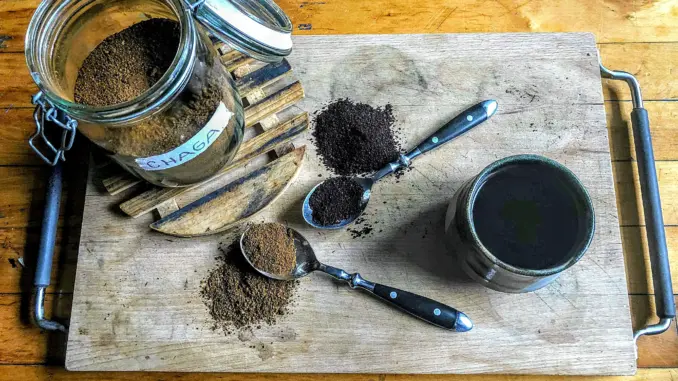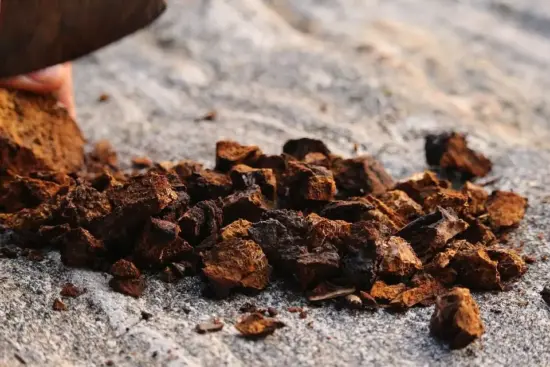
Ever tried mushrooms in your coffee? Chaga mushroom is a recent trend in the specialty-coffee world and boasts a number of health benefits.
BY EMILY JOY MENESES
BARISTA MAGAZINE ONLINE
Featured photo by Elysabeth Malenfant via Unsplash
Looking for a way to spice up your daily cup? Try adding mushrooms! No, we’re not talking about the psychedelic ones (unless that’s what you’re into). We’re talking about chaga mushrooms, one of the latest trends in the specialty-coffee world. Not only does chaga have a unique, earthy flavor, it also boasts a multitude of health benefits. In today’s installment of “Know Your Ingredients,“ we’ll explore chaga mushroom and why it has found a long-term home in many cafés.
Growing Chaga Mushrooms
Chaga mushrooms grow on the trunks of birch trees in cold regions of the Northern Hemisphere, including Siberia, Canada, and Alaska. When cultivating chaga mushrooms, the fungus is typically harvested from the wild, rather than being grown in a controlled environment. Harvesters will carefully remove the chaga mushroom from the tree trunk and then allow it to dry before processing it into extract or powder form. Due to their slow growth rate, chaga mushrooms are a rare commodity, and sustainable harvesting practices are essential to ensure their continued availability.

What Is Chaga Coffee?
Chaga mushroom coffee as we know it today was made popular primarily by the brand Four Sigmatic, but the consumption of chaga mushroom coffee can be traced to the 1940s, when the Finnish used it as a coffee substitute during World War II. Today, chaga mushroom coffee is made by mixing ground coffee beans with chaga mushroom extract or powder. The resulting beverage has a slightly earthy, nutty flavor.
Chaga mushroom coffee is often marketed as a healthier alternative to regular coffee, boasting antioxidant and anti-inflammatory properties. It’s also recommended as an energy booster that has less of a “crash” than regular coffee.
Health Benefits
Chaga mushrooms have been used for medicinal purposes in traditional medicine for centuries. These mushrooms are rich in antioxidants, which protect the body against oxidative stress caused by free radicals. They’re also a rich source of beta-glucans, which are compounds that stimulate the immune system and improve overall health.

Chaga mushrooms are believed to reduce inflammation and alleviate symptoms associated with autoimmune disorders. Studies have also shown that chaga mushrooms may have anti-cancer properties. Additionally, chaga mushrooms may help regulate blood sugar levels. In addition to the above benefits, chaga mushrooms are known to support healthy digestion and serve as a rich source of fiber. Additionally, chaga mushrooms contain compounds that can support liver health.
With all of these potential health benefits, it’s no surprise that chaga mushrooms have become increasingly popular as a natural remedy for a variety of health conditions.
In the Café World
As consumers become increasingly concerned with finding ways to incorporate health consciousness into their daily lives, more and more cafés are incorporating ingredients like chaga mushroom into their menus. L.A.-based Constellation Coffee, for example, offers Renude’s Chagaccino, which Renude describes to be a “mushroom mocha”—a combination of wild-foraged chaga mushroom, organic Peruvian cacao, cinnamon, vanilla, and monk fruit sweetener. The adaptogens in the Chagaccino are known to strengthen immunity, carry anti-aging properties, and give a boost in energy without the “jitters” that caffeine usually brings.

Located in Uptown Denver, Plant Magic Café centers its entire menu around the magic of mushrooms, specializing in adaptogenic mushroom coffee infusions. One standout beverage is their cacao latte, which uses ceremonial-grade cacao sourced directly from Guatemala.
Overall, chaga brings a unique twist on traditional coffee beverages and serves as an appealing choice for health-conscious consumers and café owners alike. While more research is needed to fully understand the effects of chaga mushroom consumption, incorporating this ingredient into your coffee routine may be worth exploring for both taste and potential health benefits.
ABOUT THE AUTHOR
Emily Joy Meneses (she/they) is a writer and musician based in Los Angeles. Her hobbies include foraging, cortados, vintage synths, and connecting with her Filipino roots through music, art, food, and beverage.

